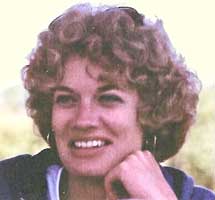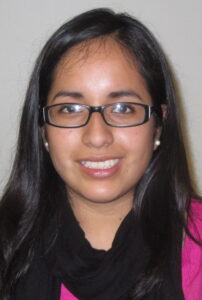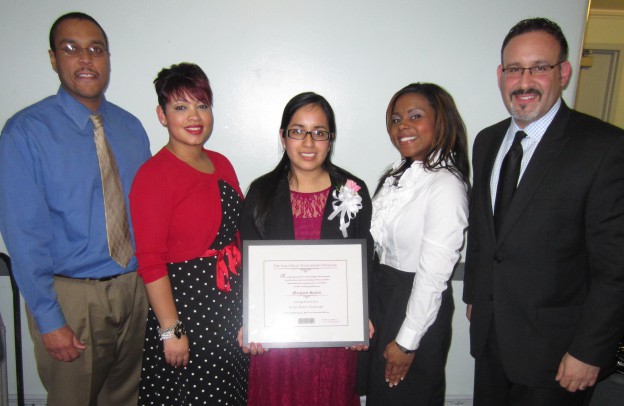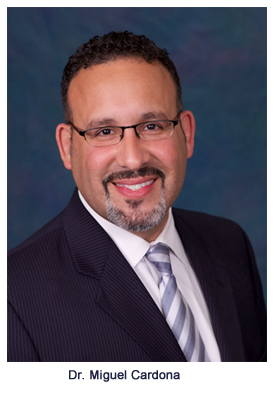Santosha Oliver, Ph.D., 2007 honoree, was assistant principal of the O’Brien STEM Academy, East Hartford Public Schools, when she was the guest speaker at the reception on April 8, 2013 to honor Margaret Seclen, the 2013 Alma Exley Scholar. With a doctorate in biomedical science, Dr. Oliver is dedicated to encouraging students, particularly girls, to develop an interest in science and mathematics and pursue higher education. In January 2014 she was appointed to oversee STEM education for the Manchester Public Schools.
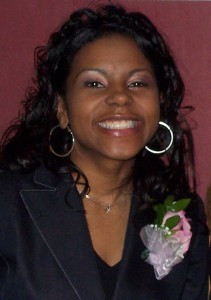
Following are excerpts from her remarks.
John Quincy Adams, our sixth president, once said, ‘If your actions inspire others to dream more, learn more, do more, and become more, you are a leader.’
Educators certainly inspire others to dream more, learn more, do more and become more – and as educational leaders, we must respond to the tremendous challenges and historic opportunities facing the nation to improve 21st century teaching and learning, and educate the whole child and not just a test score. This holistic view of 21st century teaching and learning combines rigor, technology, and support systems to help students master the 21st century skills required of them to be successful in college and careers.
According to the National Science Foundation, the size of the STEM workforce is not where it needs to be because K-12 students are not succeeding in STEM and undergraduates are leaving the STEM majors. In addition, there are noticeable gaps in STEM access and achievement. A 2012 report by the U.S. Office for Civil Rights concluded that high schools with the highest black and Hispanic enrollments have the least access to STEM courses like Algebra 2, Calculus, and Physics. We now know that Algebra 2, Physics and Calculus are the gateways to college and beyond. Perhaps this lack of preparation has in part led to the sobering statistic that only 36 percent of students nationally complete a four-year degree in four years. When we break this down, we find that only 20.4 percent of black students and 26.4 percent of Hispanic students complete a four-year degree in four years, compared to 39.3 percent for non-Hispanic white students.
In order for the United States to be globally competitive, innovative, and prepared for new economic challenges, the U.S. must have an innovative educational environment that encourages excellence in STEM subjects, regardless of gender, socioeconomic status or ethnic background.
As educational leaders, we can innovate in education and advocate for courses that will give all students, regardless of their gender, socioeconomic status or ethnic background, an opportunity not only to get into college, but remain in college and go on to earn degrees in various fields to support our infrastructure.
I will be the first to admit this will not be an easy fix. We must explore curriculum development and implementation, school administration, teacher preparation, professional development and educational technology. And we must consider the input from STEM education experts, STEM practitioners, and private companies.
At the O’Brien STEM Academy, we encourage innovative partnerships with industry, higher education and the community. For example, we recently developed a partnership with the University of Connecticut Health Center to expose students to research in developmental biology, higher education, and STEM careers.
We also participate in the Connecticut Invention Convention, which encourages critical thinking skills through innovation and STEM. Our STEM students developed inventions that were judged by STEM practitioners from United Technologies, Stanadyne and other organizations. A dozen students will go on to the state-wide Invention Convention.
We are also developing a relationship with the Connecticut Science Center to support in-school and out-of school activities, such as our annual science fair, which was extended to grades K-6 this year. In addition, our STEM teachers are trained at the Connecticut Science Center to enhance inquiry-based teaching and learning.
We now know there is truth to the African proverb that it takes a village to raise a child, and it will take the collaborative efforts of all of the aforementioned people and agencies to transform K-12 education – starting with our teachers.
With that being said, we must focus on developing good teachers, not simply measuring them. If we don’t help all teachers to succeed, we will diminish their potential impact on student learning. Again, that is why the legacy of Alma Exley is so important, and continues on today with the newest Alma Exley Scholar, Margaret Seclen.
I would like to congratulate Margaret on rising to the tremendous challenge of preparing students for careers and college in the 21st century, and inspiring all students to learn more, do more and become more. We welcome you to the distinguished network, and more importantly, the family of Alma Exley.
